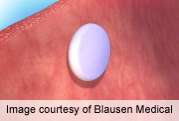(HealthDay)—Major bleeding events are rare in patients with stable coronary artery disease (CAD); however, concomitant antiplatelet therapy (APT) when oral anticoagulation is required increases bleeding risk—an independent predictor of mortality—and should be reconsidered in select patients, according to research published in the Oct. 7 issue of the Journal of the American College of Cardiology.
Martial Hamon, M.D., of the Centre Hospitalier Universitaire de Caen in France, and colleagues enrolled 4,184 consecutive CAD outpatients free from myocardial infarction or coronary revascularization for more than one year at baseline in the Suivi d'une cohorte de patients COROnariens stables en region NORd-Pas-de-Calais (CORONOR) study. The patients were followed for two years to assess the incidence, source, determinants, and prognostic impact of major bleeding in stable CAD.
The researchers found that 51 major bleeding events occurred during the follow-up period (0.6 percent per year), including 12 fatal bleeds. The majority of the bleeds (54.9 percent) were gastrointestinal. Major bleeding was associated with increased mortality (adjusted hazard ratio, 2.89; 95 percent confidence interval, 1.73 to 4.83). Increased risk of bleeding was associated with vitamin K antagonist (VKA) therapy, particularly when it was combined with APT. The risk of cardiovascular death, myocardial infarction, or nonhemorrhagic stroke did not differ for patients receiving VKA plus APT compared with those receiving VKA alone.
"In selected CAD patients in stable condition with atrial fibrillation identified by CORONOR as at high risk for bleeding, these registry observations will be heeded: stop the aspirin, continue the warfarin, and use the art of clinical medicine to guide decisions where clear information remains wanting," writes the author of an accompanying editorial.
More information:
Full Text (subscription or payment may be required)
Editorial (subscription or payment may be required)
Journal information: Journal of the American College of Cardiology
Copyright © 2014 HealthDay. All rights reserved.




















